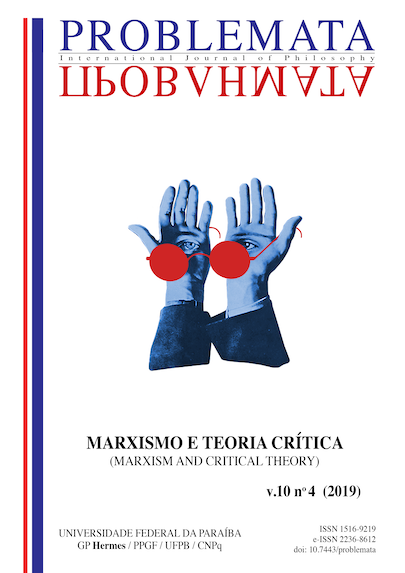ERNST BLOCH AND WALTER BENJAMIN:
REFLECTIONS ON ELECTIVE AFFINITIES
DOI:
https://doi.org/10.7443/problemata.v10i4.49679Keywords:
Marxism, Culture, Social criticismAbstract
In Pierre Bouretz’s book on the Jewish philosophers born at the time of the destruction of reason, in the chapter dedicated to Ernst Bloch, one of the central topics is a question, namely: would Bloch be a survivor brother of Walter Benjamin? The question is interesting to at least to question the existence of elective affinities between Bloch and Benjamin. With this, the pretension of an approach in which the election indicates a previous distance, a sufficiently broad and rich heterogeneity in the writings of the two philosophers, but nevertheless “the Wahlverwandtschaft [...] indicates a precise type of significant relation” (Löwy) to be established. This paper intends to reflect some theoretical links between Bloch and Benjamin and, from these possible links, to clarify a little more about two philosophers whose thought appears as essays, anti- metaphysical, romantic-revolutionary, confluence of multiple at the same time atheistic and religious, and of a messianic/“heretical” Marxism (both receiving the rejection of “official” Marxism) in which one of the central objectives of their writings was a critique of modernity which, however, was intended to save the critical potencial of it.
Downloads
References
BENJAMIN, W. Carta a Ernst Schoen de 23 de novembro de 1919. Correspondance I: 1910-1928. Trad. Guy Petitdemange. Paris: Aubier Montaigne, 1979.
BENJAMIN, W. Sobre o conceito da história. In: ______. Magia e técnica, arte e política. Trad. Sérgio Paulo Rouanet. 7. ed. São Paulo: Brasiliense, 1994.
______. Passagens. Trad. Irene Aron e Cleonice P. B. Mourão. Orgs. Willi Bolle e Olgária Matos. Belo Horizonte; São Paulo: Ed. UFMG; Imprensa Oficial do Estado de São Paulo, 2007.
BLOCH, E.; EISLER, H. A arte e a sua herança. Trad. Carlos Eduardo Jordão Machado. In: MACHADO, C. E. J. Um capítulo da história da modernidade estética: debate sobre o expressionismo. São Paulo: Ed. Unesp, 1998.
BLOCH, E. L’esprit de l’utopie. Trad. Anne Marie Lang e Catherine Tiron-Audard. Paris: Gallimard, 1977.
______. Discussões sobre o expressionismo. Trad. Carlos Eduardo Jordão Machado. In: MACHADO, C. E. J. Um capítulo da história da modernidade estética: debate sobre o expressionismo. São Paulo: Ed. Unesp, 1998.
______. Héritage de ce temps. Trad. Jean Lacoste. Paris: Payot, 1978.
______. O princípio esperança. Trad. Nélio Schneider. Rio de Janeiro: Eduerj; Contraponto, 2005. Vol. 1.
______. O princípio esperança. Trad. Werner Fuchs. Rio de Janeiro: Eduerj; Contraponto, 2006. Vol. 2.
______. Rêve diurne, station debout et utopie concrète: Ernst Bloch en dialogue. Entretiens avec José Marchand en 1974. Trad. Arno Münster. Paris: Lignes, 2016.
______. Thomas Münzer, teólogo da revolução. Trad. Vamireh Chacon e Celeste Aída Galeão. Rio de Janeiro: Tempo Brasileiro, 1973.
BLOCH, E. Über Walter Benjamin. Frankfurt am Main: Suhrkamp, 1968.
BOURETZ, P. Testemunhas do futuro: filosofia e messianismo. Trad. J. Guinsburg et al. São Paulo: Perspectiva, 2011.
BUCK-MORSS, S. Dialética do olhar: Walter Benjamin e o projeto das Passagens. Trad. Ana Luiza Andrade. Belo Horizonte; Chapecó: Ed. UFMG; Argos, 2002.
GAGNEBIN, J.-M. Lembrar, escrever, esquecer. São Paulo: Ed. 34, 2006.
GARBER, K.; GAGNEBIN, J.-M. Por que um mundo todo nos detalhes do cotidiano? Revistas USP, 1992. Disponível em: http://www.revistas.usp.br/revusp/article/view/25666/27403
HABERMAS, J. Ernst Bloch: um Schelling marxista. In: ______. Habermas: Sociologia. Org. e trad. Bárbara Freitag e Sérgio Paulo Rouanet. 3. ed. São Paulo: Ática, 1993. (Grandes Cientistas Sociais).
IVERNEL, P. D’Ernst Bloch a Walter Benjamin. In: RAULET, G. (Dir.). Utopie - marxisme selon Ernst Bloch: un système de l’inconstructible. Paris: Payot, 1976.
JIMENEZ, J. La estética como utopia antropológica: Bloch y Marcuse. Madrid: Tecnos, 1983.
KANGUSSU, I. M. G. Passagens: imagem e história em Walter Benjamin. Dissertação de Mestrado, Belo Horizonte, Universidade Federal de Minas Gerais, 1996.
LACOSTE, J. Présentation. In: BLOCH, E. Héritage de ce temps. Trad. Jean Lacoste. Paris: Payot, 1978.
LÖWY, M. “A contrapelo”. A concepção dialética da cultura nas teses de Walter Benjamin. Lutas sociais, São Paulo, n. 25/26, 2010-2011.
______. Redenção e utopia: o judaísmo libertário na Europa central. Trad. Paulo Neves. São Paulo: Companhia das Letras, 1989.
______; SAYRE, R. Revolta e melancolia: o romantismo na contracorrente da modernidade. Trad. Nair Fonseca. São Paulo: Boitempo, 2015.
MARRAMAO, G. Poder e secularização: as categorias do tempo. Trad. Guilherme de Andrade. São Paulo: Ed. Unesp, 1995.
MÜNSTER, A. Ernst Bloch: filosofia da práxis e utopia concreta. São Paulo: Ed. Unesp, 1993.
MACIEL, M. M. A.; VIEIRA, A. R. A tematização do futuro no pensamento de Ernst Bloch ou a crítica às filosofias do passado. In: TIMM, R.; RODRIGUEZ, U. (Orgs.). Ernst Bloch: atualidade das utopias concretas. Porto Alegre: Ed. Fi, 2016. Vol. 1.
ROUANET, S. P. As razões do iluminismo. São Paulo: Companhia das Letras, 1987.
TIEDEMANN, R. Introdução à edição alemã. In: BENJAMIN, W. Passagens. Trad. Irene Aron e Cleonice P. B. Mourão. Orgs. Willi Bolle e Olgária Matos. Belo Horizonte; São Paulo: Ed. UFMG; Imprensa Oficial do Estado de São Paulo, 2007.
Downloads
Published
Issue
Section
License
Authors who publish with this journal agree to the following terms:
- Authors retain copyright and grant the journal right of first publication with the work simultaneously licensed under a Creative Commons Attribution License that allows others to share the work with an acknowledgement of the work's authorship and initial publication in this journal.
- Authors are able to enter into separate, additional contractual arrangements for the non-exclusive distribution of the journal's published version of the work (e.g., post it to an institutional repository or publish it in a book), with an acknowledgement of its initial publication in this journal.
-
- Authors are permitted and encouraged to post their work online (e.g., in institutional repositories or on their website) prior to and during the submission process, as it can lead to productive exchanges, as well as earlier and greater citation of published work (See The Effect of Open Access).





